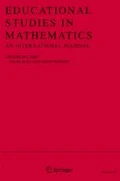Abstract
Recent advances in the way that adults perform computation in our society require reconsideration of the assumptions underlying current elementary mathematics instruction. The widespread use of calculators and computers for situations requiring precise calculation removes much of the motivation for teaching the current addition, subtraction, multiplication, and division algorithms. Yet precisely this use of computing technology now puts a premium on the exercise of estimation techniques for verifying the reasonableness of computations. These techniques, especially those that can be used “mentally” (without the use of any external tools), have been used informally for years, but never formalized for instruction. This paper discusses a range of estimation techniques, and presents in detail a series of mental estimation procedures based on the concepts of measurement and real numbers rather than on counting and integers. A set of techniques for teaching these procedures is described. These estimation techniques are evaluated against the multiple functions that elementary mathematics instruction needs to serve.
Similar content being viewed by others
References
BallW. W. R.: 1908, A Short Account of the History of Mathematics, Dover Publications, New York (unabridged republication, 1960).
BrownJ. S. and BurtonR. B.: 1978, ‘Diagnostic models for procedural bugs in basic mathematical skills’, Cognitive Science 2, 155–192.
Brown, J. S. and Van Lehn, K.: in press, ‘Towards a generative theory of “bugs”’, In T. E. Romberg, T. Carpenter and J. Moser (eds.), Addition and Subtraction: A Developmental Perspective, Erlbaum, Hillsdale, N.J.
BurtonR. B.: 1980, ‘DEBUGGY: Diagnosis of errors in basic mathematicals skills’, In D. H.Sleeman and J. S.Brown (eds.), Intelligent Tutoring Systems, Academic Press, London.
CooperL. A.: 1975, ‘Mental transformation of random two-dimensional shapes’, Cognitive Psychology 7, 20–43.
DugdaleS. and KibbeyD.: 1975, Fractions curriculum of the Plato elementary school mathematics project, Computer-based Education Research Laboratory, University of Illinois, Urbana, IL.
GaltonF.: 1907, Inquiries in Human Faculty and its Development, E. P. Dutton & Co., New York.
GinsburgH.: 1977, Children's Arithmetic: The Learning Process, Van Nostrand, New York.
KosslynS. M.: 1975, ‘Information representation in visual images’, Cognitive Psychology 7, 341–370.
Lave, J.: 1979, ‘A model of mundane arithmetic problem solving’, Paper presented at the SSRC Conference on Cultural Representations of Knowledge, La Jolla, CA.
LevinJ. A. and KareevY.: 1980, ‘Problem solving in everyday situations’, The Quarterly Newsletter of the Laboratory of Comparative Human Cognition 2, 47–52.
LopesL. L.: 1976, ‘Model-based decision and inference in stud poker’, Journal of Experimental Psychology: General 105, 217–239.
PetittoA. L.: 1975, Numbers in Space: Case Histories of Three Imagers, Cornell University, Ithaca, N.Y.
ShepardR. N., KilpatricD. W. and CunninghamJ. P.: 1975, ‘The internal representation of numbers’, Cognitive Psychology 7, 82–138.
ShepardR. N. and MetzlerJ.: 1971, ‘Mental rotation of three-dimensional objects’, Science 171, 701–703.
StickerH.: 1955, How to Calculate Quickly Dover Publications, New York.
Author information
Authors and Affiliations
Additional information
Note
This research has been supported by The Spencer Foundation. Thanks to Randy Souviney, Margaret Riel, Marilyn Quinsaat, Andrea Petitto, Bud Mehan, and Karen Johnson for comments on earlier drafts.
Rights and permissions
About this article
Cite this article
Levin, J.A. Estimation techniques for arithmetic: Everyday math and mathematics instruction. Educ Stud Math 12, 421–434 (1981). https://doi.org/10.1007/BF00308140
Issue Date:
DOI: https://doi.org/10.1007/BF00308140




